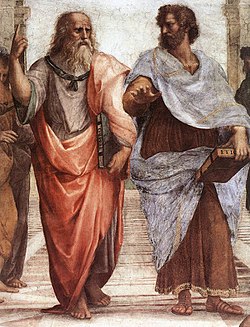
Back Teleologie Afrikaans غائية Arabic Teleologiya Azerbaijani Тэлеалёгія BE-X-OLD Телеология Bulgarian উদ্দেশ্যবাদ Bengali/Bangla Teleologija BS Teleologia Catalan ئاکامباوەڕی CKB Teleologie Czech

Teleology (from τέλος, telos, 'end', 'aim', or 'goal', and λόγος, logos, 'explanation' or 'reason')[1] or finality[2][3] is a branch of causality giving the reason or an explanation for something as a function of its end, its purpose, or its goal, as opposed to as a function of its cause.[4] James Wood, in his Nuttall Encyclopaedia, explained the meaning of teleology as "the doctrine of final causes, particularly the argument for the being and character of God from the being and character of His works; that the end reveals His purpose from the beginning, the end being regarded as the thought of God at the beginning, or the universe viewed as the realisation of Him and His eternal purpose."
A purpose that is imposed by human use, such as the purpose of a fork to hold food, is called extrinsic.[3] Natural teleology, common in classical philosophy, though controversial today,[5] contends that natural entities also have intrinsic purposes, regardless of human use or opinion. For instance, Aristotle claimed that an acorn's intrinsic telos is to become a fully grown oak tree.[6] Though ancient atomists rejected the notion of natural teleology, teleological accounts of non-personal or non-human nature were explored and often endorsed in ancient and medieval philosophies, but fell into disfavor during the modern era (1600–1900).
- ^ Partridge, Eric. 1977. Origins: A Short Etymological Dictionary of Modern English. London: Routledge, p. 4187.
- ^ Mahner, Martin; Bunge, Mario (2013-03-14). Foundations of Biophilosophy. Springer Science & Business Media. ISBN 9783662033685.
- ^ a b Dubray, Charles. 2020 [1912]. "Teleology". In The Catholic Encyclopedia 14. New York: Robert Appleton Company. Retrieved 3 May 2020. – via New Advent, transcribed by D. J. Potter
- ^ Júnior, Paulo Pereira Martins; Vasconcelos, Vitor Vieira (2011-12-09). "A teleologia e a aleatoriedade no estudo das ciências da natureza: sistemas, ontologia e evolução" [Teleology and randomness in the study of the natural sciences: systems, ontology and evolution]. Revista Internacional Interdisciplinar INTERthesis (in Portuguese). 8 (2): 316–334. doi:10.5007/1807-1384.2011v8n2p316. ISSN 1807-1384.
- ^ Allen, Colin (2003). "Teleological Notions in Biology". Stanford Encyclopedia of Philosophy.
- ^ Aristotle, Metaphysics, 1050a9–17